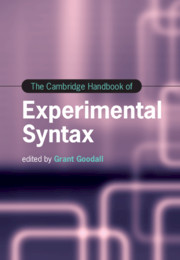Book contents
- The Cambridge Handbook of Experimental Syntax
- The Cambridge Handbook of Experimental Syntax
- Copyright page
- Contents
- Figures
- Tables
- Contributors
- Introduction
- Part I General Issues in Acceptability Experiments
- Part II Experimental Studies of Specific Phenomena
- Part III Experimental Studies of Specific Populations and Language Families
- Part IV Experimental Syntax beyond Acceptability
- Index
Introduction
Published online by Cambridge University Press: 16 December 2021
- The Cambridge Handbook of Experimental Syntax
- The Cambridge Handbook of Experimental Syntax
- Copyright page
- Contents
- Figures
- Tables
- Contributors
- Introduction
- Part I General Issues in Acceptability Experiments
- Part II Experimental Studies of Specific Phenomena
- Part III Experimental Studies of Specific Populations and Language Families
- Part IV Experimental Syntax beyond Acceptability
- Index
Summary
>What is “experimental syntax”? One could reasonably argue that all syntax is experimental, in the sense that traditional syntactic research is based on series of small, informal experiments. On the other hand, one might understand “experimental syntax” to refer to psycholinguistic and neurolinguistic experiments that focus on the structure of sentences. In practice, though, the term “experimental syntax” is generally used to refer to the intersection of these two approaches: studies that focus on the varying acceptability of sentence types and explore this by means of formal experiments. The goal of the handbook is to review what we have learned in the area of experimental syntax, but also to make sense of what this new body of knowledge is telling us, understand how experimental studies relate to the study of syntax more broadly, and explore what type of work we should be doing as the field moves forward.
Keywords
Information
- Type
- Chapter
- Information
- The Cambridge Handbook of Experimental Syntax , pp. 1 - 4Publisher: Cambridge University PressPrint publication year: 2021
